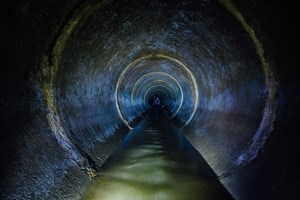Japan eyes delay of Fukushima radioactive wastewater release
TOKYO (AP) — Japan has revised the timing of a planned release to the sea of treated but still radioactive wastewater at the Fukushima nuclear power plant to "around spring or summer," indicating a delay from the initial target of this spring, after factoring in the progress of a release tunnel and the need to gain public support.
The government and the plant operator, Tokyo Electric Power Company Holdings, announced in April 2021 a plan to begin releasing the treated wastewater into the sea starting in spring 2023. They say more than 1 million tons of water stored in about 1,000 tanks at the plant are hampering its decommissioning and risk leaking in the event of a major earthquake or tsunami.
Under the current plan, TEPCO will transport the treated water through a pipeline from the tanks to a coastal facility, where it will be diluted with seawater and sent through an undersea tunnel, currently under construction, to an offshore outlet. The company has acknowledged the possibility of rough winter weather and sea conditions delaying the tunnel progress.
Chief Cabinet Secretary Hirokazu Matsuno told reporters Friday the government has adopted a revised action plan, which includes enhanced efforts to ensure safety and measures to financially support the local fishing industry and a new release target of "around spring or summer this year."
TEPCO President Tomoaki Kobayakawa said that despite the government's new timing for the wastewater release, his company still aims to have the facility ready by the spring. He also acknowledged a lack of local understanding about the release and pledged to continue efforts to ease safety concerns.
A massive earthquake and tsunami in 2011 destroyed the Fukushima plant's cooling systems, causing three reactors to melt and release large amounts of radiation. Water used to cool the damaged reactor cores, which remain highly radioactive, has since leaked into the basements of the reactor buildings and has been collected, treated and stored in tanks.
The release plan has been fiercely opposed by fishermen, local residents and Japan's neighbors, including China and South Korea. Fukushima residents worry the reputation of their agricultural and fishing products will be further damaged.
Most of the radioactivity is removed from the water during treatment, but tritium cannot be removed and low levels of some other radionuclides also remain. The government and TEPCO say the environmental and health impacts will be negligible as the water will be slowly released after further treatment and dilution by large amounts of seawater.
Some scientists say the impact of long-term, low-dose exposure to tritium and other radionuclides on the environment and humans is still unknown and the release plan should be delayed. They say tritium affects humans more when it is consumed in fish.
Japan is cooperating with the International Atomic Energy Agency to increase the safety, transparency and understanding of the water discharge plan. An IAEA team that visited Japan a number of times for talks and plant inspections last year will visit again in January to meet with nuclear regulators and will release a final report before the planned release begins.
Related News
From Archive

- Glenfarne Alaska LNG targets late-2026 construction start for 807-mile pipeline project
- U.S. water reuse boom to fuel $47 billion in infrastructure spending through 2035
- $2.3 billion approved to construct 236-mile Texas-to-Gulf gas pipeline
- Major water pipe break in Puerto Rico hits over 165,000 customers
- Potomac River Tunnel project enters construction phase beneath Washington, D.C.
- Pennsylvania American Water launches interactive map to identify, replace lead water service lines
- Trump's tariffs drive $33 million cost increase for Cincinnati sewer project
- Utah city launches historic $70 million tunnel project using box jacking under active rail line
- Tulsa residents warned after sewer lines damaged by boring work
- Fatal trench collapse halts sewer construction in Massachusetts; two workers hospitalized




Comments